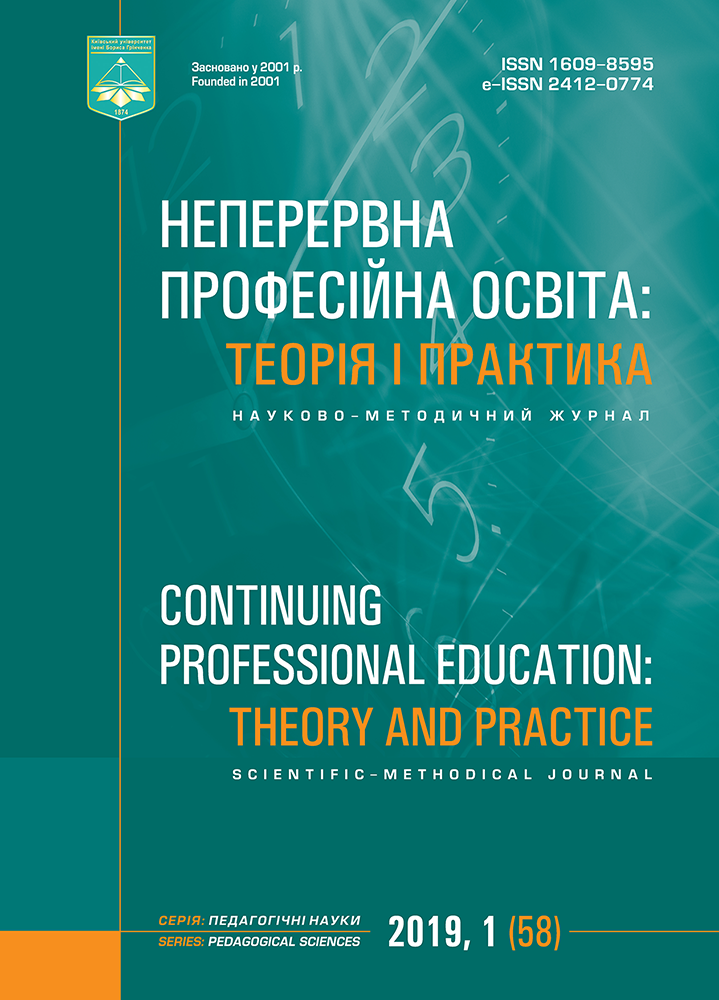RESEARCH-BASED TRAINING FOR PREPARATION OF PROFESSIONALS OF THE SOCIAL SPHERE IN GERMANY
DOI:
https://doi.org/10.28925/1609-8595.2019.1.7379Keywords:
educational system, professional training, research-based training system, specialist of social sphere.Abstract
The article deals with the educational systems of research-based training for preparation of specialists of social sphere in Germany. On the basis of the research of foreign scientists and previous researches of the author it was set that the system of research-based training is defined as a complex of pedagogical purposes, which are combined with the main tasks in the development of research competence of students (development of skills for setting the research task and finding ways to solve it). The system of research-based training for preparation of specialists of social sphere in two leading universities of Germany (University of Cologne (Cologne, Germany) and Humboldt University (Berlin, Germany)) has been analysed. It is established that not every Master’s program involves studying with the use of research techniques. However, it was found that the research-based training system of study in its proper application encompasses not just the student’s research activity partly detached from the educational process, but is reflected in each student’s discipline. Each discipline reveals one of the aspects / tasks / areas of student research and in parallel serves as a practical basis for the development of professionally meaningful competences. Prospects for further research we see the study of the individual research and educational trajectory of the student through the entire period of training in the research-based training system for specialists of the social sphere and the development of methodological recommendations for the use of such a trajectory and system in the Ukrainian system of higher education.References
Aditomo, A., Goodyear, P., Bliuc, A.-M., Ellis, R. A. (2013). Inquiry-based learning in higher education: principal forms, educational objectives, and disciplinary variations. Studies in Higher Education, 38, 1239–1258. DOI: 10.1080/03075079.2011.616584 (eng).
Beddoe, L. (2011). Investing in the Future: Social Workers Talk about Research. The British Journal of Social Work, 41, Issue 3, 557–575. DOI: https://doi.org/10.1093/bjsw/bcq138 (eng).
Greenwood, D. J., Levin, M. (2007). Introduction to Action Research: Social Research for Social Change. Thousand Oaks, USA: Sage Publication (eng).
Ifenthaler, D. & Gosper, M. (2014). Research-based learning: connecting research and instructions. In M. Gosper, D. Ifenthaler (Eds.), Curriculum Models for the 21st Century: Using Learning technologies in Higher Education (pp. 73–89). New York, USA: Springer. DOI: 10.1007/978-1-4614-73-66-4_5 (eng).
Levy, P. & Petrulis, R. (2012). How do first year university students experience inquiry and research, and what are the implications for the practice of inquiry-based learning? Studies in Higher Education, 37 (1), 85–101 (eng).
Ludwig, J. (2011). Forschungsbasierte Lehre als Lehre im Format der Forschung. Retrieved from http://www.sq-brandenburg.de/files/bbhd03.pdf (ger).
Marsh, P., Fisher, M. (2008). The Development of Problem-Solving Knowledge for Social Care Practice. The British Journal of Social Work, 38, Issue 5, 971–987. DOI: https://doi.org/10.1093/bjsw/bcm116 (eng).
May, T. (2011). Social Research: Issues, Methods and Process. Berkshire, Great Britain: Open University Press (eng).
Mills, J. E. & Treagust, D. F. (2003). Engineering education – Is problem-based or project-based learning the answer? Australasian Journal of Engineering Education. Retrieved from http://www.aaee.com.au/journal/2003mills_ treagust03.pdf (eng).
Pavliuk, R. O.; Liakh, T. L.; Bezpalko, O. V.; Klishevych, N. A. (2017). Research-based training: methodological characteristics and results of the analysis of educational programs. Social Sciences, 6 (4), 152. DOI: 10.3390/ socsci6040152 (eng).
Prince, M. J., & Felder, R. M. (2006). Inductive teaching and learning methods: Definitions, comparisons, and research bases. Journal of Engineering Education, 95 (2), 123–138 (eng).
Wildt, J. (2011). ‘Forschendes Lernen: Wie und Warum?’, Presentation at Leibniz University Hannover, 13. October 2011. Retrieved from https://www.zqs.uni-hannover.de/fileadmin/institut/pdf/Forschendes_Lernen_Leibniz_ Universitaet_Hannover_Prof._Dr._Dr._Wildt_13.10.2011.pdf (ger).
Zvierieva, I. D. (Ed.) (2012). Entsyklopediya dlya fakhivtsiv sotsial’noyi sfery [Encyclopedia for professionals in the social sphere]. Kyiv, Simferopol, Ukraine: Universum (ukr).
Mekshun, A. D., Ostrianko, T. S. (2017). Istorychnyj ekskurs stanovlennja socialjnoji roboty ekonomichno rozvynutykh krajin z pidghotovky socialjnykh pracivnykiv [Historical excursion of the formation of social work of economically developed countries in training of social workers]. Problemy socialjnoji roboty: filosofija, psykhologhija, sociologhija, 1 (9), 54–61 (ukr).
Saiko, N. (2017). Systema profesijnoji pidghotovky socialjnykh pedaghoghiv u Nimechchyni [System of professional training of social pedagogues in Germany]. Vytoky pedaghoghichnoji majsternosti, 19, 385–390 (ukr).
Sysoieva, S. O., Krystopchuk, T. Ye. (2012). Osvitni systemy krajin Jevropejsjkogho Sojuzu: zaghaljna kharakterystyka [Educational systems of countries of the European Union: general characteristics]. Rivne, Ukraine: Ovid (ukr).
Yakovliev, M. V., Kabachenko, N. V. (2011). Osvita ta profesijna pidghotovka socialjnykh pracivnykiv: styslyj oghljad svitovoji praktyky [Education and training of social workers: a concise overview of world practice]. Naukovi zapysky NaUKMA. Pedaghoghichni, psykhologhichni nauky ta socialjna robota, 123, 54–60 (ukr).
Downloads
How to Cite
Issue
Section
License
Copyright (c) 2020 Roman Pavliuk

This work is licensed under a Creative Commons Attribution-NonCommercial 3.0 Unported License.



